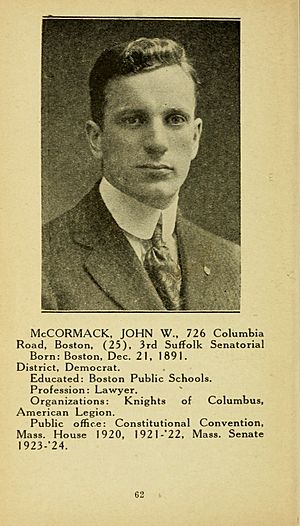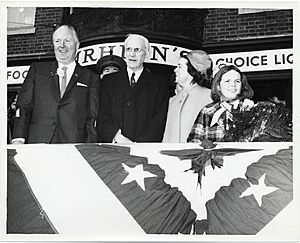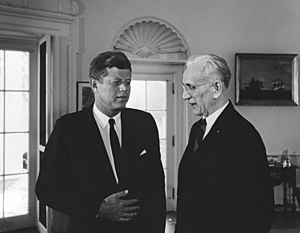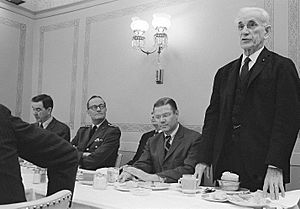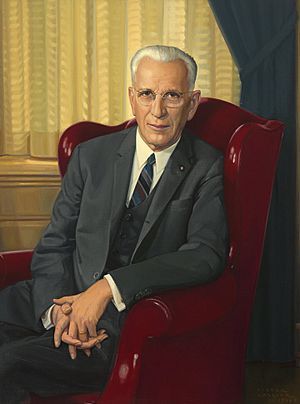John W. McCormack facts for kids
Quick facts for kids
John McCormack
|
|
|---|---|
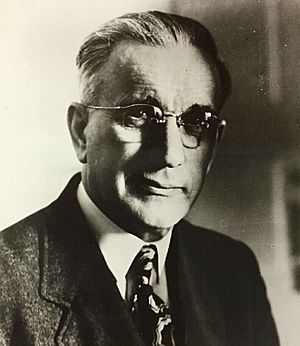
McCormack, c. 1955
|
|
| 45th Speaker of the United States House of Representatives | |
| In office January 10, 1962 – January 3, 1971 |
|
| Preceded by | Sam Rayburn |
| Succeeded by | Carl Albert |
| Leader of the House Democratic Caucus | |
| In office January 10, 1962 – January 3, 1971 |
|
| Preceded by | Sam Rayburn |
| Succeeded by | Carl Albert |
| House Majority Leader | |
| In office January 3, 1955 – January 10, 1962 |
|
| Deputy | Carl Albert |
| Preceded by | Charles A. Halleck |
| Succeeded by | Carl Albert |
| In office January 3, 1949 – January 3, 1953 |
|
| Deputy | Percy Priest |
| Preceded by | Sam Rayburn |
| Succeeded by | Charles A. Halleck |
| In office September 16, 1940 – January 3, 1947 |
|
| Deputy | Patrick J. Boland Robert Ramspeck John Sparkman |
| Preceded by | Sam Rayburn |
| Succeeded by | Charles A. Halleck |
| House Minority Whip | |
| In office January 3, 1953 – January 3, 1955 |
|
| Leader | Sam Rayburn |
| Preceded by | Leslie C. Arends |
| Succeeded by | Leslie C. Arends |
| In office January 3, 1947 – January 3, 1949 |
|
| Leader | Sam Rayburn |
| Preceded by | Leslie C. Arends |
| Succeeded by | Leslie C. Arends |
| Member of the U.S. House of Representatives from Massachusetts |
|
| In office November 6, 1928 – January 3, 1971 |
|
| Preceded by | James A. Gallivan |
| Succeeded by | Louise Day Hicks |
| Constituency | 12th district (1928–1963) 9th district (1963–1971) |
| Member of the Massachusetts Senate from the 3rd Suffolk district |
|
| In office 1923–1928 |
|
| Preceded by | William H. McDonnell |
| Succeeded by | Henry Parkman Jr. |
| Member of the Massachusetts House of Representatives from the 11th Suffolk district |
|
| In office 1920–1922 Serving with James B. Troy
|
|
| Preceded by | Patrick M. Costello, Michael J. Reidy |
| Succeeded by | Hugh H. Garrity, Walter B. Grant |
| Personal details | |
| Born | December 21, 1891 Boston, Massachusetts |
| Died | November 22, 1980 (aged 88) Dedham, Massachusetts |
| Resting place | Saint Joseph Cemetery West Roxbury, Massachusetts |
| Political party | Democratic |
| Spouse |
Harriet Joyce
(m. 1920; died 1971) |
| Relatives | Edward J. McCormack Jr. (nephew) |
| Profession | Politician |
| Military service | |
| Allegiance | |
| Branch/service | |
| Years of service | 1918 |
| Rank | Sergeant Major |
| Unit | 14th Company, 151st Depot Brigade Infantry Replacement Center, Camp Lee, Virginia |
| Battles/wars | World War I |
John William McCormack (born December 21, 1891 – died November 22, 1980) was an American politician from Boston, Massachusetts. He was a lawyer and a member of the Democratic Party. McCormack served in the United States Army during World War I. After the war, he was elected to the Massachusetts House of Representatives and the Massachusetts State Senate.
Later, he won an election to the United States House of Representatives. McCormack had a very long career in the House, from 1928 to 1971. He moved up in leadership roles, becoming the majority leader. Eventually, he was chosen as the 45th Speaker of the House. He held this important position from 1962 until he retired in 1971.
McCormack's time in Congress was known for his support of major government programs. These included the New Deal programs, which helped the country during the Great Depression. He also supported U.S. involvement in World War II. In the 1960s, he backed the Great Society programs. These programs focused on civil rights, education, and health care for older people. McCormack was strongly against communism and supported the U.S. involvement in the Vietnam War.
His support for the war and the way Congress was organized (seniority system) led to younger members challenging his leadership. McCormack won a challenge for the Speaker role in 1969 against Mo Udall. He decided not to run for re-election in 1970 and retired to his home in Boston. He passed away in 1980 at a nursing home in Dedham, Massachusetts.
John McCormack served in the U.S. House for 42 years and 58 days. This makes his service one of the longest in U.S. history. He is the longest-serving member of the U.S. House from Massachusetts.
Contents
Early Life and Education
John McCormack was born in Boston on December 21, 1891. His father, Joseph H. McCormack, was from Prince Edward Island, Canada. His mother was Mary Ellen O'Brien McCormack from Boston. John said he was one of 12 children, but many of them died young.
McCormack left school after the eighth grade to help his family. He first worked as an errand boy for a company. He also managed a large newspaper delivery route with his brothers. Later, he worked for a lawyer named William T. Way. McCormack began to study law with Way. He passed the Massachusetts bar exam at age 21. This allowed him to become a lawyer, even though he did not go to high school or college.
Start of His Political Journey
As a young man, McCormack got involved in politics. He gave speeches to support local Democratic candidates. In May 1917, McCormack was chosen to be a member of the Massachusetts Constitutional Convention. He represented the 11th Suffolk District.
Service in World War I
In June 1918, McCormack joined the United States Army during World War I. He was first stationed at Fort Devens, Massachusetts. He then went to Camp Lee, Virginia, for officer training. McCormack rose through the ranks from private to sergeant major. He was attending Officer Training School when the war ended in November 1918. He was discharged soon after.
Continuing His Political Career
After the war, McCormack returned to practicing law and politics. He was elected to the House from 1920 to 1922. Then, he served in the Senate from 1923 to 1926. During his time in the Senate, he was the Democratic floor leader in 1925 and 1926.
In 1926, he ran for Congress but did not win. However, he made a good impression. He then focused on his law career and became a successful trial attorney. McCormack was also a delegate to many Democratic National Conventions.
Congressional Career Highlights
McCormack got another chance to run for Congress when the current Congressman died in 1928. McCormack won both the special election to finish the term and the general election for a full term. He was re-elected 20 times. He served in the House from November 6, 1928, to January 3, 1971. He chose not to run for re-election in 1970.
Early Years in Congress
When McCormack first started in the House, he served on the Committee on Territories. In his second term, Speaker John Nance Garner appointed him to the important Ways and Means Committee. He served there until 1941.
McCormack consistently supported liberal policies throughout his time in Congress. This included backing the New Deal programs. In 1934, he led a special committee that investigated Communist and Nazi groups in the United States before World War II.
Rising to House Leadership
When Sam Rayburn became Speaker in 1940, he supported McCormack for majority leader. This helped McCormack win the position. For the next 21 years, McCormack was the second-highest-ranking Democrat in the House. He served as majority leader when Democrats were in charge. He was also the minority whip when Republicans controlled the House.
McCormack was always strongly against both Communism and Fascism. He played a key role in extending the military draft just before the attack on Pearl Harbor. This was important because many people in the U.S. did not want to get involved in World War II at that time.
He also led a committee that created the National Aeronautics and Space Administration (NASA). This happened between 1957 and 1959.
Becoming Speaker of the House
After Speaker Rayburn passed away in November 1961, McCormack became acting Speaker. He was then officially elected Speaker in early 1962. He served as Speaker from January 1962 until his retirement in 1971.
His nine years as Speaker were largely focused on passing Great Society laws. These laws were part of President Lyndon B. Johnson's plan. They included laws to expand civil rights, improve access to public education, and provide health care for older people.
McCormack was the first Catholic to be elected Speaker. Some people felt his religion influenced his leadership. For example, in 1961, he wanted to include church schools in a bill for federal aid to schools. This disagreement caused the bill to fail. However, in 1963, McCormack changed his view. He then helped pass an aid bill mainly for public schools.
Later in his time as Speaker, much of the focus was on the Vietnam War. McCormack supported the war. During these years, he seemed like a kind older relative trying to guide younger family members. House members said McCormack was good at connecting with people. This made them want to work with him.
However, the seniority system in Congress gave a lot of power to committee leaders. The Speaker could not always control them. As Speaker, McCormack worked on national issues. He was proud of helping pass farm bills, even though his district was mostly urban.
After President John F. Kennedy was assassinated on November 22, 1963, McCormack was next in line to become President. This lasted until Hubert Humphrey became Vice President in January 1965. Because of this, McCormack received Secret Service protection.
In January 1969, Congressman Mo Udall tried to replace McCormack as Speaker. In 1970, more politicians urged McCormack to step down because of his age. McCormack decided not to run for re-election in early 1970. He announced his decision publicly in May. Louise Day Hicks succeeded McCormack as Representative. Carl Albert became the new Speaker.
Retirement and Passing
John McCormack lived in retirement in Boston. He passed away from pneumonia in a Dedham nursing home on November 22, 1980. He was buried at Saint Joseph Cemetery in West Roxbury, Massachusetts.
His Lasting Impact
In 1983, the University of Massachusetts Boston created the John W. McCormack Institute of Public Affairs. In 1985, a building at the university was named John W. McCormack Hall in his honor. The McCormack Institute became a graduate school in 2003. In 2010, it was renamed the McCormack Graduate School of Policy and Global Studies. Today, the school teaches about social justice, government openness, and strengthening democracy.
The John W. McCormack Post Office and Courthouse in Boston was built in the 1930s. It was renamed in McCormack's honor. It became a Boston landmark in 1998 and was added to the National Register of Historic Places in 2011.
The John W. McCormack Middle School in Dorchester was also named after him. A Massachusetts state government office building in Boston also carries his name.
Family Life
In 1920, McCormack married Marguerite Harriet Joyce. She was an opera singer, but she stopped her career after they married. The McCormacks did not have any children.
When Congress was meeting, they lived at the Washington Hotel. Stories about McCormack's dedication to his wife were well-known. Friends said they always ate dinner together, no matter how late McCormack worked. They also said they never spent a night apart.
The McCormacks were devoted Roman Catholics. He was a Knight of Columbus. Both were honored by the Vatican for their work for the church.
Harriet McCormack passed away at age 87 in December 1971. She had been in the hospital for a long time. For over a year, McCormack had stayed in a room next to hers every night.
Edward J. McCormack Jr., John McCormack's nephew, served as Massachusetts Attorney General. He also ran for U.S. Senator and Governor of Massachusetts.
 | Stephanie Wilson |
 | Charles Bolden |
 | Ronald McNair |
 | Frederick D. Gregory |


